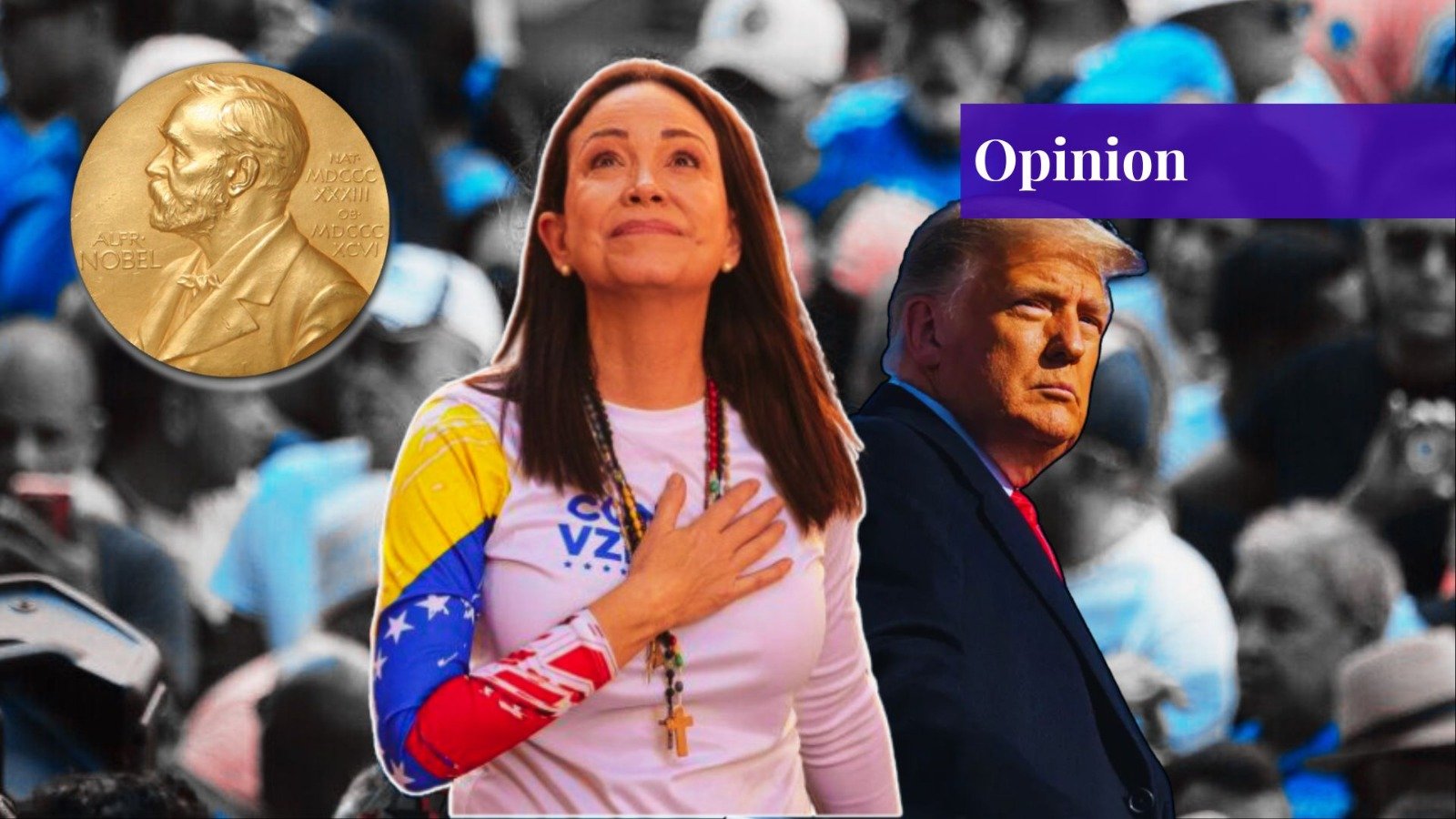“She is receiving the Nobel Peace Prize for her tireless work promoting democratic rights for the people of Venezuela and for her struggle to achieve a just and peaceful transition from dictatorship to democracy.”
– Nobel Peace Prize Committee
Maria Corina Machado is an opposition leader and former member of the national assembly of Venezuela. She is also known as the founder of the political movement Vente Venezuela. Due to her anti-government campaigns, she was banned from being a nominee in elections, she was harassed, and she was also accused of treason. She is against her government as she doesn’t support an authoritarian regime; rather, she is a pro-democrat.
Recently, the Nobel Peace Prize event was organized, and Maria Corina Machado won the Nobel Peace Prize for the year 2025. As stated in Alfred Nobel’s will, fraternity between nations, disarmament, and peacemaking, Maria Corina meets all three criteria. She advocates cooperation among states by promoting democracy in Latin America. Her campaigns focused on non-violence, international mediation, fair elections, and the promotion of peace.
The US President Donald Trump was also nominated for the Nobel Peace Prize, but he did not win. Is this his diplomacy? Because it is very much unconvincing when examined through a geopolitical lens, as President Trump was also a great candidate to win this prize. No one in history has stopped 8 wars in just 8 months, of which the Israel-Palestine conflict was very much highlighted. If we view the current situation of Venezuela, the US has increased its military presence in the Caribbean and Eastern Pacific, saying that the US is targeting drug traffickers. Also, US warships and aircraft have been sent to international waters near Venezuela as part of the deployment. In this critical situation, winning a peace prize is unconvincing, and then dedicating her prize to President Trump is difficult to accept.
How Does Maria Corina Machado Winning the Nobel Peace Prize 2025 Assist US Goals?
Venezuela has more than 303.2 billion barrels of oil reserves, as per the 2025 reports of World Population Review. The US has only 45 billion barrels; in comparison, Venezuela has 5 times more oil reserves than the US. Venezuela’s oil reserves are in the Orinoco Belt. According to the data provided by Observatory of Economic complexity (OEC), Venezuela exported just $4.05bn of oil in 2023, which is less than Saudi Arabia’s export ($181bn) and Russia’s export, which was $122bn. This happened due to tariffs imposed by Trump in 2017, which restricted Venezuela’s ability to export crude oil to the US. As a result, exports to the US were ceased and Venezuela shifted its trade towards China, India, and Cuba.
Wired’s investigation for 2025 reported on personal US government operations within the CIA. They reported on operations meant to destabilize Maduro’s support from the military. To the US government, the stability of the regime in Caracas is a question of strategic importance. This relates to the argument put forth in the Atlantic Council, which contends that “recalibrated U.S. policy” aimed at Venezuela would make the US “safer, stronger, more prosperous,” further revealing the intersection of resource control, the democratic facade, and geopolitical containment within a single strategic justification.
On the other hand, the Congressional Research Service (CRS) pointed out that Venezuela’s increasing relationship with Russia, China, and Iran is also within the scope of the US doctrine and, in effect, challenges control by the US on the Monroe Doctrine.
US Grand Strategy
Maria Corina Machado’s Nobel Peace Prize appears less as an isolated moral commendation and more as a symbolic instrument aligning with the US’s long-term goal of promoting a managed political transition that safeguards Western access to Venezuela’s vast natural wealth while countering the influence of rival powers. The US used the Nobel Peace Prize as a soft power instrument. Through this, the US framed a narrative that it only wants to promote democracy, not regime change in Venezuela. The Nobel gives Machado moral and diplomatic credibility to represent Venezuela internationally.
The US, under its Monroe Doctrine, doesn’t want any foreign entity to control Latin America. Because if other powers control Latin America, the region will be divided into pro-US and pro-China/Russia. Giving the Nobel Peace Prize to Venezuela could be a soft power strategy of the US because Venezuela alone can turn the geopolitics of the whole of Latin America. The US’s next step will play a crucial role in deciding whether the region will be multipolar or unipolar under US hegemony.
Conclusion
Some view Maria Corina Machado’s Nobel Peace Prize as a calculated step from the US, but we must know that the Nobel Committee is independent of any political party. But still, often in geopolitics, the line between power and principles is blurred, as in the Venezuela case. It remains a question whether it marks a sincere victory for human rights or a subtle reaffirmation of the US influence. Ultimately, the impact of Maria Corina’s recognition will reveal if Latin America moves toward authentic democratic renewal or if it becomes another arena in the enduring great-power rivalry of the Western Hemisphere.
“Politics has no relation to morals”
– Niccolò Machiavelli
If you want to submit your articles and/or research papers, please visit the Submissions page.
To stay updated with the latest jobs, CSS news, internships, scholarships, and current affairs articles, join our Community Forum!
The views and opinions expressed in this article/paper are the author’s own and do not necessarily reflect the editorial position of Paradigm Shift.


